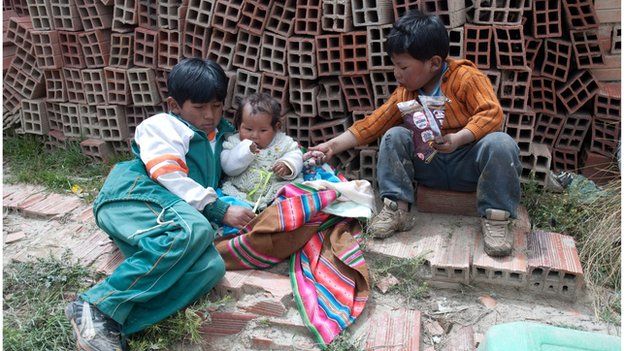Child labour laws: A step back for advancing Bolivia?
- Published

For nine-year-old Samuel Juan Ramos Gomez, brick making is part of everyday life. When he has finished school for the day, he puts down his pencil and picks up a shovel, helping his parents in the small brick factory at the back of his house.
Samuel Juan's family lives in a village called Alpacoma. It is a mountainous area tucked away in a poor corner of La Paz. But it is rich with raw materials.
Trucks constantly rumble through its centre, delivering piles of rubble to the villagers, who are mostly employed in the brick making industry.
Samuel Juan's body is not strong enough yet to be able to pick up bricks but when he turns 12 he can contribute to the wages and boost their current earnings of $72 (£46) a month.
"Here, most children work and help from 10 or 12," says Samuel Juan's mother Francisca Gomez Rodriguez. "Children lend a hand because sometimes we can't make ends meet."
Economic migrants
Samuel Juan's family lives in a small room provided by their employer. He shares a bed with his parents, his younger brother Juan Manuel and his baby sister Naeli.
Most families in the town come from parts of Bolivia such as Potosi and Oruro - mining areas where children have traditionally worked in dangerous jobs from a young age.
Recent figures are hard to come by, but in a report from 2008, it was estimated that about 800,000 children worked in Bolivia. Of that, 491,000 were under the age of 14. That equates to about one in four children.
Bolivia is one of the poorest countries in Latin America. It has made huge economic strides in the past decade as a result of high commodity prices.
With the money that it has earned, socialist President Evo Morales has boosted social spending programmes and his popularity among Bolivians recently gave him a third term as president.
New child labour law
But a law passed in July that lowered the minimum working age was seen by many as a huge step back.
The BBC's Katy Watson reports on the controversy surrounding child labour in Bolivia
The new bill kept the official minimum working age at 14, in line with international labour conventions in developing countries.
But it introduced two exceptions. For children aged between 10 and 12, work is allowed if they attend school, are self-employed and get parental permission. And from 12, children can do light work for others - mining and brick making are not considered light work.
In all cases, the work needs to be authorised and registered with a child protection officer.
"We know the realities of Bolivia," says Katarina Johansson Mekoulou, the deputy representative of Unicef in Bolivia. "However, these two exemptions to the minimum age are of great concern to us because we see this as a risk - the most vulnerable children will be at risk of abuse."
The International Labour Organization (ILO) argues that child labour should not be justified as a necessary evil, nor as a development strategy, but sponsors of the bill disagree. They say this law addresses Bolivia's needs and is part of a plan to eradicate extreme poverty by 2025.
Losing their innocence
"A step back would be turning a blind eye to the reality for the boys and girls who work," says the politician Javier Zavaleta, who was one of the sponsors of the new bill.
"Any man or woman from a developed country who walks around the poorest neighbourhoods of Bolivia will see things that they'll never understand because poverty is really extreme in some parts in Bolivia.
"But we aren't making laws for developed countries, we're making laws for Bolivians."
Back in Alpacoma, I met Maria Rosminda Quispe, who runs a centre offering families healthcare and educational facilities. Whether it is little boys helping in the brickworks or little girls looking after their younger siblings while their parents work, all forms of child labour are problematic, she says.
"A child begins to lose his innocence and starts to assume an attitude of an adult," she says. "Physically, their growth speeds up, they have wider shoulders, more calluses on their hands and they end up having the profile of an adult.
"And then of course we have the social issues, the relationships. Those children find it hard to be with their peers who don't work. They look for people who are older than them."
Law v reality
For her, the law it is not a way out of poverty.
"Many parents and mothers are going to decide that they can work or the child will feel that the law is supporting him," she says. "But we aren't considering the consequences that it will have on the life of the child. Laws tell you one thing, but reality is another."
Brian, a 14-year-old who comes to the centre to do homework every day, is an example of that reality.
He has been making bricks with his family for as long as he can remember, putting in up to five hours a day. He would prefer to study if he had a choice.
He wants to be an architect and his parents support him. But how to pay for his education? Make more bricks, he says.
It is a vicious circle for many children in Bolivia.
- Published18 July 2014
- Published7 February 2023
- Published11 June 2014
- Published20 May 2014
- Published28 May 2012